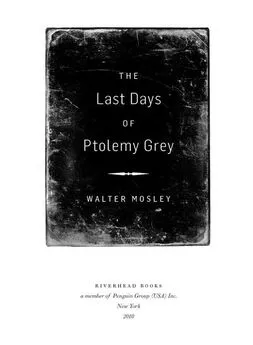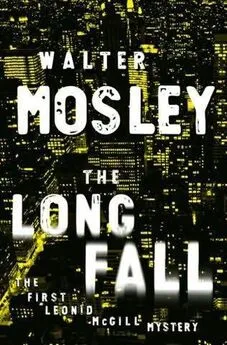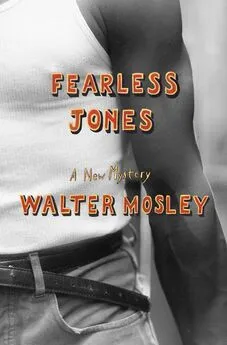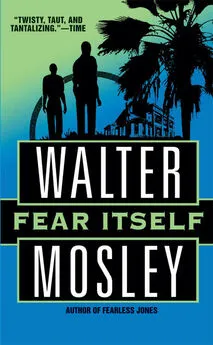Walter Mosley - The Last Days of Ptolemy Grey
- Название:The Last Days of Ptolemy Grey
- Автор:
- Жанр:
- Издательство:неизвестно
- Год:неизвестен
- ISBN:нет данных
- Рейтинг:
- Избранное:Добавить в избранное
-
Отзывы:
-
Ваша оценка:
Walter Mosley - The Last Days of Ptolemy Grey краткое содержание
The Last Days of Ptolemy Grey - читать онлайн бесплатно полную версию (весь текст целиком)
Интервал:
Закладка:
His knuckles hurt every time the fist got tight—but not that bad. His fiery mind was still in an old man’s body. He was weak as a boy and old as a man can get, but not as bad as he was—not half as bad.
You know everything,” Li’l Pea said to Coy one day when Coy had told him about George Washington Carver and the peanut.
“No, child,” Coy said in a surprisingly gentle tone, “it’s you know more’n me.”
Li’l Pea giggled and said, “Me? I’on’t hardly know nuthin’.”
“That might be, but still you know more’n me.”
“Like what?” the child asked, not realizing the impossibility of his question.
“You know how crickets smell and what pebbles sound like when they fall on the ground around yo’ feet. You see deep in the sky without havin’ to look or think about it, and you love your mama an’ yo’ daddy so much that they would die if God took you from them.”
“Don’t you know all them things?” the boy asked, sobered by the seriousness of the older man’s words.
“Like a suit’a clothes,” Coydog said. “I got them things like a new suit just off the rack, but they fit you like skin.”
“I don’t get you, Coy,” the boy said.
“The older you get the more you live in the past,” Coy intoned like a minister introducing his sermon. “Old man like me don’t have no first blue sky or thunderstorm or kiss. Old man like me don’t laugh at the taste of a strawberry or smell his own stink and smile. You right there in the beginnin’ when everything was new and true. My world is made outta ash and memories, broken bones and pain.
“Old man see the same things and walk the same roads he know so well that he don’t even have to open his eyes to make his way. Right and wrong two sides’a the same coin for me, but for you there’s only right. Somebody say sumpin’ an’ you hear ’em just like they say.”
“But what do you hear, Uncle Coy?”
“I hear everybody I evah knew talkin’ ’bout things nobody know no more. I hear preachers an’ judges, white men and black. I hear ’em talkin’ ’bout tomorrow when I know that was a long time ago.”
Ptolemy the old man considered his uncle. Maybe that’s when Coy made up his mind to rob Jersey Manheim. Maybe he was so tired of following the same path that he decided to jump off the road and make it through the wilderness one more time.
Papa Grey?” Hilly was saying through the line. “Papa Grey, you there?”
Ptolemy realized that he was drifting again; but not the way he had when he was feebleminded. Now he carried the past with him rather than being carried on the back of the brute that was his history.
“Was you an’ Reggie friends?” Ptolemy asked Hilly.
“We cousins, man.”
“But was you friends? Did you go out drinkin’ together? Did you talk?”
“Sure, we talked. We lived in the same house until he moved out with Nina.”
“But,” Ptolemy asked, dimly reminded of his first phone conversation with the boneheaded boy, “did you share your secrets wit’ him an’ did he tell you what was what?”
“I ain’t got no secrets, Papa Grey. I’ma man, not no child.”
“Did you tell Niecie why I didn’t wanna let you back in my house?”
After a long, angry silence, Hilly said, “No.”
“We all got secrets, boy. An’ the older we get the more secrets we got. Child tell ya anything, but a man just sip his drink an’ keep his mouf shet. But he might have one friend he talk to. Was you that friend to Reggie?”
“No.”
“Do you know who that friend was?”
The silence no longer shivered with anger. Ptolemy could almost hear his taciturn great-nephew thinking.
“Billy Strong,” Hilly said at last.
“Who’s he?”
“He run the gym on Slauson and Twenty-third.”
“Him an’ Reggie was close?”
“Yes, sir. They’d get together all the time. All the time.”
“An’ he work at the gym?” Ptolemy asked.
“Uh-huh.”
“All day?”
“Every day, Saturday and Sunday too.”
Ptolemy Grey hadn’t really slept after he’d awakened from the coma. He’d close his eyes and enter into a world both new and old to him. There he’d talk to Coy along the Tickle River and carry boxes of medicine in France for soldiers, most of whom were destined to die. He delivered ice and swept streets, made love to Sensia Howard so hard sometimes that he’d limp for a day or two afterward.
One night, with his eyes closed and his mind imagining, he inhabited his old feebleminded self, sitting in front of the TV. The black woman, who looked like a white woman passing for black, was talking about the war.
“More than a hundred Iraqis died in a suicide blast in the city of Tuz Khormato today. The suicide bomber set off his truck bomb in a crowded marketplace at midday.”
“Excuse me, lady,” Ptolemy said.
For a moment it seemed that she’d continue her report, not hearing his interruption, but then she turned and looked at him, into his living room. It was the old living room filled with stacks of moldering and unread newspapers, furniture, and trash.
“Who are you?” the woman asked.
“I’m Mr. Grey,” Ptolemy said formally.
The woman looked as if she wanted to turn away from him but found that she could not. She touched her ear as Ptolemy had often watched her do in the old days when he didn’t understand hardly anything. She touched it, but her ear didn’t help her change the subject or look away.
“My name is Ginger,” the woman in the vision said.
“Tell me, Ginger, what are you talkin’ about twenty-four hours a day?”
“The news, Mr. Grey. It’s the news.”
“What news?”
“There’s a war going on. People are dying.”
“Who’s the enemy? Is it Hitler again?”
“We aren’t quite sure who the enemy is. That’s what makes this war so hard.”
“If we don’t know who we fightin’, then how can we fight ’em?”
“We . . . ,” she said, and paused. “We . . . we aim our weapons at them and when they become frightened and take out their guns we know who they are.”
“I don’t get it, Ginger.”
“Me neither, Mr. Grey.”
“How can a man have a enemy an’ fight that enemy and still not know who he is?” Ptolemy asked, proud of his ability to string his words together like a necklace of great big black Hawaiian pearls.
“Haven’t you ever heard of Zorro?” Ginger asked.
“The masked man?”
“Yes, he was a man who hid his face and struck against his enemies.”
Ptolemy’s stomach grumbled. It was a deep, hungry sound that surprised him. He opened his eyes in the bed, realizing that sleep was no different than wakefulness and that he hadn’t eaten all day.
A groan and then a whimper scurried at the edge of his consciousness. He knew that it was this sound, and not his stomach, that had pulled him away from Ginger. He climbed out of the bed in the dark room and crept toward the door.
He peeked through the crack and saw that it was Robyn moaning. She was naked, on her back, and the boy was above her, his arms at the side of her head, his middle going up and down like the oil-well derricks in Baldwin Hills pumping the oil out of the ground.
“Oil is the earth’s blood,” Coy had told Li’l Pea one day. “Men cut deep into the world’s skin an’ suck out the blood like it belong to them. That’s why they’s earthquakes and tidal waves, because the earth is our mother, but she don’t like our ways.”
Robyn’s feet went up straight and trembled and she said something that had no real words. The boy moved faster and grunted, and she took his face in her hands. They gazed at each other in the murky room; a candle set on top of the TV was the only light; then Beckford fell on his side next to the girl and kissed her cheek. They whispered in the darkness, stroking each other’s face and head.
Ptolemy watched them as if from a great distance, maybe even through time itself. After a while, when their hands came to rest and he knew that they were asleep he went back to his bed and closed his eyes, finding Ginger there waiting for him, ready to continue their conversation about the invisible, nameless enemy and the war waged against him.
When Ptolemy came out of the bedroom, at six in the morning, Beckford was already gone. Robyn was sprawled in her bed with her mouth agape and left breast exposed. Ptolemy pulled the blankets up to her chin and went into the kitchen to boil water in an old tin saucepan for instant coffee and to think about his last days.
He sat down at the small table, one of the pieces of furniture he wouldn’t let Robyn throw out. It was at that table where he and Sensia Howard had their morning visit for so many years. If he looked down, he felt her presence, and then he’d look up, expecting to see her.
“I’ll be back later,” she’d always say. “Don’t wait.”
But he did wait for her . . . even after she died and had gone for good. That was the beginning of his descent into confusion. Many a morning he’d awaken, looking for her. Some days he didn’t remember that she was dead until afternoon. He could see this all clearly now with the Devil’s medicine running in his veins.
“All them years wasted,” he said to himself, sipping the hot coffee and wishing he had a cigarette.
He walked out to his gated porch that opened onto a concrete backyard. It was a large space, a forty-foot-by-forty-foot square of bleached, synthetic stone. There was a wobbly redwood fence along the back, twelve-foot-high foot-wide slats that leaned and teetered in the slightest breeze. Three apartments opened onto the prison-like yard, but no one ever went there. Ugly red-brick buildings rose on every side. Looking up, he could see small patios jutting out from the upper floors, gated by iron bars and for the most part forgotten. These were used to house bicycles and crates, a place to dry hand-washed laundry and for rusted-out barbecue grills.
A middle-aged woman was sitting outside, six stories up. She was smoking and staring out.
Ptolemy watched her for many minutes, but she didn’t look down. The years flashed across his mind’s eye while he waited for the mature woman, who was young enough to be his daughter, to look down on him. In that time, women had loved him and men had cursed him. He’d been seduced by his friend Major’s wife, LeAnne. It was a spur-of-the-moment thing, something LeAnne did all the time. Major never knew, or maybe he didn’t care to know.
Sensia saw it the second Ptolemy walked through the door.
“Who is it?” she asked him. He hadn’t taken off his coat yet.
“Who is what?”
“Her.”
“I don’t know what you talkin’ ’bout, Sensie. I just been down at the bar with Ralph and them.”
“It’s LeAnne, ain’t it?” Her rage was cold and fierce, not a human fury but that of an animal who knows no fear or reason.
“I don’t know what you’re talkin’ ’bout, Sensia Howard. You the one might flit off with a man at the drop of a hat.”
Her silence was worse than her questions or insights. Ptolemy, standing in that concrete yard, could still feel the wrath coming off of his first true love.
He didn’t know what to say, so he left. He already felt bad about Major. LeAnne had just offered him a drink, and the next thing he knew they were on the checkered sofa of Major’s house, rutting and laughing, stopping to drink wine from time to time.
And now that Sensia was mad, he left L.A. and went out to Riverside, where he took a room and got a job at the gas station. That was Tuesday. He knew Sensia would never love him again. He knew that he broke a pact by sleeping with his friend’s wife. Between Tuesday afternoon and Saturday morning he downed a pint of sour-mash whiskey each night, sinking into a stupor rather than falling asleep.
Читать дальшеИнтервал:
Закладка:






![Джеймс Купер - Последний из могикан, или Повествование о 1757 годе [The Last Of The Mohicans]](/books/1067513/dzhejms-kuper-poslednij-iz-mogikan-ili-povestvovan.webp)
![О Генри - Последний лист [The Last Leaf]](/books/1074386/o-genri-poslednij-list-the-last-leaf.webp)

